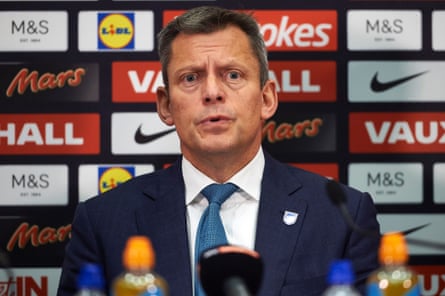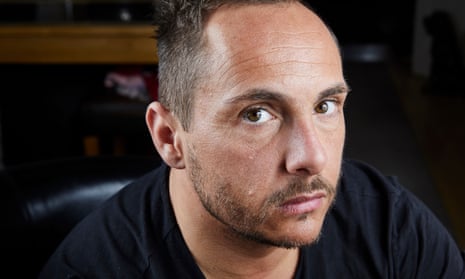Police have been flooded with victims alleging they were abused as children in football and on Thursday said they were investigating alleged attacks on 350 people, with more complaints expected.
The complaints to police came after Guardian revelations about child sexual abuse in football and police chiefs are vowing to hunt down anyone responsible – no matter how long ago the crimes took place.
The 350 victims reporting crimes to police will have their cases investigated, officers say, with a priority being to identifying alleged offenders who may still pose a danger to children.
Police said the calls came in just six days, from 24 to 30 November, and related to all aspects of football, from grassroots up to professional.
The number continues to grow, police said, and victims may have to wait because of the “significant” volume of alleged incidents.
In one area alone, Greater Manchester police – one of 17 forces investigating historical abuse allegations in youth football – said they had identified 10 suspects after receiving reports from 35 victims.
In a statement the national police chiefs’ council lead for child protection, chief constable Simon Bailey, said: “We continue to encourage those who have been the victim of child sexual abuse to report it, regardless of how long ago the abuse may have taken place. We will listen and treat all reports sensitively and seriously.
“When allegations are reported it enables police to assess whether there are current safeguarding risks and to ensure that appropriate action is taken to prevent children being abused today.
“As the number of calls being received across the service is high, it may take longer than normal for an officer from a local force to make contact to follow up from the initial call, but please be assured that the information provided will be taken seriously and acted upon.”
Bailey added: “It is important to note that this is an indicative figure only, and that information is still being collated, numbers will therefore continue to change.”
Police and experts believe the sexual abuse of children is massively underreported in Britain.
The former Newcastle United striker David Eatock became the latest footballer to tell police he was sexually abused in the sport. He told the Guardian that he was sexually abused during his time at the club by George Ormond, a former club youth coach. Northumbria Police said they had launched Operation Tide into child abuse in the 1980s and 90s at Newcastle United.
Allegations of abuse are being recorded and investigated local to the area where each allegation was made, the national police chiefs’ council said.
More than a quarter of UK police forces are investigating allegations of historical child sex abuse in football. Derbyshire Constabulary, Devon and Cornwall, Warwickshire, Avon and Somerset, Essex and Norfolk police are the latest to confirm they are investigating claims, bringing the tally to 17.
North Yorkshire, Dorset, Staffordshire, Greater Manchester, North Wales, Cambridgeshire, Hampshire, Cheshire, Scotland Yard and Police Scotland have also launched inquiries.
Greater Manchester police said: “We have received a number of calls from victims and those with concerns and on a daily basis the investigation is growing. We are currently in the process of speaking to victims in person and providing them with specialist support.
“As of today, Thursday 1 December 2016, we are investigating reports from 35 victims and we have identified 10 suspects.”
Also on Thursday the Football Association’s chief executive, Martin Glenn, promised to punish any club found guilty of covering up sexual abuse “regardless of size”. Glenn was speaking on the day it was revealed that the new, dedicated NSPCC helpline for football received 860 calls in its first week.
Chelsea paid compensation to a former youth-team player who says he was sexually assaulted by the club’s then chief scout Eddie Heath during the 1970s. Heath worked at the club between 1968 and 1979 and died in the late 1980s. The payment was sanctioned at boardroom level on the advice of Chelsea’s insurers within the past three years.
Chelsea’s compensation settlement was made on the condition that a confidentiality agreement was signed preventing the victim, his family or lawyers speaking publicly about the allegations. Such an order might have been considered standard in compensation settlements at the time, and in effect designed to protect both victim and the club. Chelsea confirmed on Thursday that the confidentiality on the case has been lifted.
Glenn said: “We’ve committed to a full review, shining the light on what happened in the past in football. We have clear rules in the game and if there’s any evidence of a breach of those – and hushing up would be one – subject to due process, the police need to be at the right place in this, when it’s our turn to apply the rules we absolutely will, regardless of size of club.”
When pressed on the possible existence of non-disclosure agreements and gagging orders, Glenn said: “I can’t say if there has been a cover-up in the game [but] I doubt it.”

Chelsea have retained an external law firm to carry out an investigation into Heath. They said they would fully cooperate with the FA’s wider investigation but would make no further comment while those inquiries were ongoing.
This week the FA chairman, Greg Clarke, outlined the scope of the governing body’s investigation, which is being led by Kate Gallafent QC, and said he found the idea that any victim had been paid off to protect a club’s image as “morally repugnant”. The governing body’s head of equality and safeguarding, Sue Ravenlaw, added that it could also be illegal.
Glenn said on Thursday: “If there are restrictive contracts, through employment law, which prevent people from speaking out about a crime, because that’s what we’re talking about, then it must be dealt with.
“But the primacy needs to be sorted out: where does the police get involved, where does the FA? But the only way this gets dealt with is through openness and honesty.”
Reflecting on the calls to the NSPCC helpline for football, Glenn said: “Child abuse is a society issue and obviously because of football’s importance – we have three million people playing football every weekend, 800,000 volunteers – the scale is big. So it is hard to say of those calls, whether that is a large number or a small one. I don’t know how many are real or how many will be followed up.
“Of course there is going to be a growing awareness of it and I welcome it because it needs to be dealt with because there are clearly some damaged people whose bravery we should acknowledge in actually coming out. It will help uncover some issues that can’t happen again but do I think there has been a cover-up? I doubt it. The FA has since the late 1990s taken child safety extremely seriously.”
